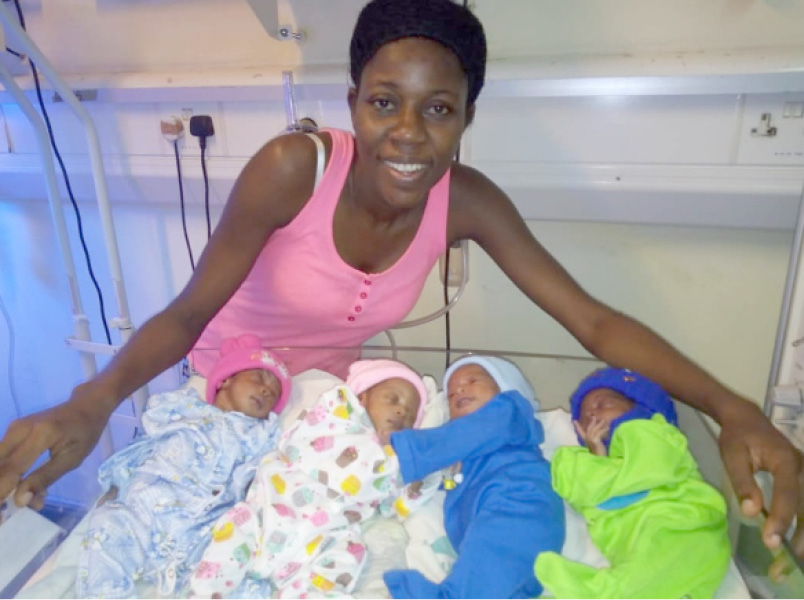The Amodu’s had a three-year-old. When the couple became pregnant, they prayed it would be twins.
Considering economic reasons and the cost of raising children, Ernest and his wife Temitope planned to stop having children. They were in for a shocker: instead of twins, they had quadruplets.
Temitope wasn’t new to pregnancy illness. In her first pregnancy, she didn’t sign up for antenatal clinic until she was four months along.
“But for this one I got sick early and this made me visit the hospital on time and this led to me finding out what kind or pregnancy on time,” she says.
Tests confirmed a multiple birth was expected. It wasn’t immediately clear what the sexes would. The only thing clear was that four babies were sharing her womb.
“I was shocked and scared. I wondered how I would carry four babies at the same time. I remembered what I went through during my first pregnancy and this is the second one,” she recalls. “I was thinking how I would carry the pregnancy.”
Ernest has always wanted a small family, but they had to go on.
The all-girl quadruplets were born pre-term at seven months through caesarean section at National Hospital last Thursday.
They have been in incubators to stabilise them through the early stages of pre-term birth.
“It hasn’t been easy. You know it is not easy providing for one child in Nigeria,” says Ernest.
“You can now imagine how tough it is proving for four newborns. Our responsibility has been quadrupled with the coming of our babies. So, I see things becoming even more tasking for us.”
Ernest is a civil defender stationed in Ogun State. His wife Temitope teaches in a private school in Abuja. The couple and their three-year-old son share a two-bedroom apartment.
For one, doctors have already determined the apartment is no longer conducive with four new babies and the extra human hands expected.
“In fact, the doctors told us that our apartment is not conducive for our newborns. The doctors advised that the basic we need is an apartment where we have a room for the babies, a room for their stay-in care givers and a room for ourselves,” says Amodu.
“Then I wish we could afford a better car because we are just managing the small one we have. Above all, we are going to get caregivers for the quadruplets, we have to pay them. In any area that good Samaritans can help us, we will be grateful.”
The Amodu’s are not new to multiple births – at least in their extended family.
“My mother and my father’s families have two sets of twins,” says Temitope.
“My mum’s mother gave birth to twins twice, though they didn’t survive because, I guess then we didn’t have as many people being taken care of in health facilities like now.”
Quadruplets are rarer than twins or triplets. At least 3,500 sets have been recorded up until nearly a decade ago.
But they are becoming more common due to fertility treatment. Around 70 sets of all-identical quadruplets are on record globally.
National Hospital also witnessed the birth of the all-girl Udehi quintuplets last year. But the Amodu quadruplets are a different story: they were conceived naturally.
Other multiple births on record around the country have been the cause of estrangement, with fathers bolting as they break under pressure to feed more mouths than they can handle.
Amodu says his faith stopped him.
“As a Christian I believe that there is no challenge a man faces that God can’t help him to survive it.”
When a scan first showed their expectation for twin babies would be overshot by two extra, it took both husband and wife going to hospital together to confirm the scan.
After that first scare, their desire now is to raise their children.
“Honestly, I can’t do it on my own. The thought of it is overwhelming,” says Temitope.
“But I know that God will provide me help. God is a God of abundance, He is the one who gives children for a purpose and He will raise help for us.”
Looking back on the trouble, the only thing the new mother would have wanted different is the sex distribution of her newborns.
“I would have preferred them to be mixed sex. But I am okay and happy with them being all girls. At some point, scans couldn’t really give us their gender. We checked and checked, but they couldn’t give us an accurate prediction. We even bought things for boys and girls. But now that they are out, they are girls and I am glad they are. At some point, I told God ‘let your will be done ‘. His will is that they be all girls and I am okay with this. I think it’s better to have four girls at time, than four boys, judging by how energetic my first son is,” she ended, laughing.

 Join Daily Trust WhatsApp Community For Quick Access To News and Happenings Around You.
Join Daily Trust WhatsApp Community For Quick Access To News and Happenings Around You.


